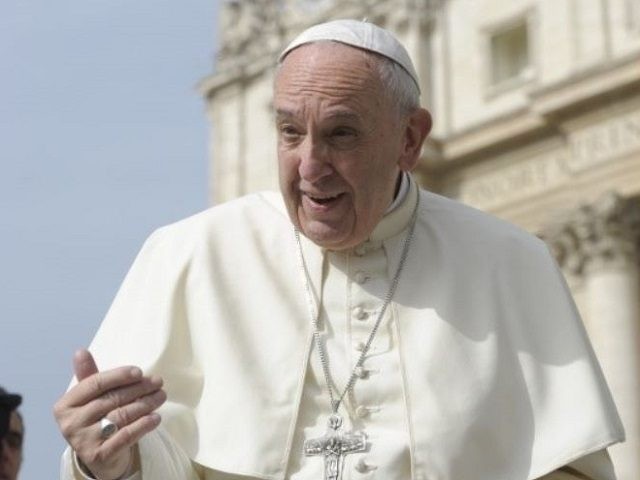Only to the extent that a person is able to say “no” to the devil can he say “yes” to Christ, Pope Francis told pilgrims in his weekly audience on Wednesday.
Meeting with tens of thousands of visitors in Saint Peter’s Square, the pope spoke of the sacrament of baptism, reminding his hearers that there is a “close connection” between renouncing Satan and professing faith in Christ.
“To the extent that I say ‘no’ to the suggestions of the devil – the one who divides –am I able to say ‘yes’ to God who calls me to conform to him in thoughts and works,” Francis said. “It is not possible to put conditions on our adherence to Christ.”
The human heart can only have one master, the pontiff suggested, and can be attached to the things of God only by detaching itself from the things of the devil and this world.
“We need to detach from certain bonds in order to really embrace other ones,” he said. “We need to break bridges, leaving them behind us, to undertake the new Way that is Christ.”
Just as the answer to the question “Do you renounce Satan, and all his works, and all his seductions?” is formulated in the first person singular: “I renounce,” so the faith of the church is also professed in the singular, as “I believe,” he said.
“The renunciation of sin, of the seductions of Evil, of Satan, the origin and cause of all sin, and, on the positive side, faith in what the church believes, are not momentary acts, limited to the time of baptism; They are attitudes that accompany all the growth and maturation of the Christian life.
For the second week in a row, Pope Francis stressed the centrality of rejecting Satan in the Christian life, with special reference to the sacrament of baptism.
Last Wednesday, the pope delivered a similar address packed with allusions to spiritual warfare, urging Christians to combat Satan and all the forces of evil.
In his weekly General Audience a week ago, Francis reminded pilgrims that the Christian sacrament of baptism includes a prayer of exorcism because accepting Jesus requires a renunciation of the devil and “all his pomps and works.”
“The gospel bears within it the strength to transform those who receive it with faith, wresting them from the dominion of the Evil One to learn to serve the Lord with joy and newness of life,” he said.
The gestures contained in the rite of baptism “assure those who are preparing to be born again as children of God that the prayer of the church assists them in the fight against evil, accompanies them on the way of good, and helps them to escape from the power of sin to pass into the kingdom of divine grace,” Francis said.
As he has often done, the pontiff rejected figurative interpretations of Satan, insisting that the devil is real and not just a mythical figure.
“As the Gospels attest, Jesus himself battled and cast out demons to reveal the arrival of God’s Kingdom,” he said. “His victory over the power of the evil one leaves free space for the lordship of God who rejoices and reconciles with life.”
In early April, Pope Francis released a new teaching letter where these reflections on Satan were also in evidence.
The “malign power” of Satan is always in our midst, the pope wrote, and “poisons us with the venom of hatred, desolation, envy and vice.”
Satan is not “a myth, a representation, a symbol, a figure of speech or an idea,” Francis wrote in his letter called Gaudete et Exsultate (“Rejoice and Be Glad”), and falling into this error “would lead us to let down our guard, to grow careless and end up more vulnerable.”
“When we let down our guard, he takes advantage of it to destroy our lives, our families and our communities,” he said. “Like a roaring lion, he prowls around, looking for someone to devour,” he added, quoting from the New Testament first letter of Peter.
Acknowledging the existence of the devil is essential, the pontiff insisted, because the spiritual warfare Christians fight is not merely “a battle against the world and a worldly mentality” or a “struggle against our human weaknesses and proclivities.”
“It is also a constant struggle against the devil, the prince of evil,” he said.
Follow Thomas D. Williams on Twitter Follow @tdwilliamsrome

COMMENTS
Please let us know if you're having issues with commenting.